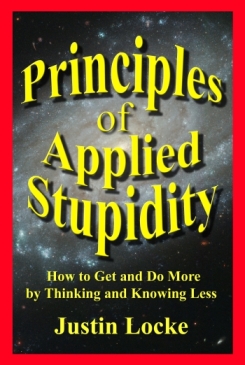I confess there are times when I wonder if I’ve shot myself in the marketing foot by titling my last book Principles of Applied Stupidity. I of course had the best of intentions, but there are virtually no situations or context where the word “stupid” is thought to be positive, so when a potential event-planning client comes along and glances at that title, I shudder to think what their first impression must be.
On the other hand, it has marvelous shock value, it is very attention grabbing, and a lot of people immediately laugh out loud when they see it . . .Which of course, makes it a classic Justin Locke title. It was also wide-open as a “brand,” and so I’ll have no problems with anyone grabbing it any time soon I think.
But for anyone who might be interested, especially since I got this fabulous Writeup on Jenise Fryatt’s blog, I thought I would try and explain myself a little bit to the first timer.
Okay, quick story: as I recounted in my Pops memoir (Real Men Don’t Rehearse), one of the most fun things I did at Pops was taking over the role of the section choreographer. It was entirely my call as to when and where the bass section would do various visual or audio hijinks. While I had a blast doing this, I will confess to you that in the eight bars prior to every bass spin, my guts were churning like mad. By daring to do something out of the ordinary in a highly conformed situation, by taking on a leadership position, I was creating the possibility of infinite negative consequences. In other words, I was risking “looking stupid.”
Now you might think that there would be no issue in this . . . I mean, my being a professional performer, onstage every night, et cetera et cetera. But the thing is, being an orchestral bass player, for the most part, is all about just conforming and “following orders.” I could play ridiculous contemporary pieces with a totally straight face, and afterwards nonchalantly say, “doesn’t matter to me… I just work here.” I was not responsible if you liked it or if you did not like it. If it fell flat with the audience, was not my responsibility. I was safe, but in that smug smart sense of safety I had no real investment in the proceedings either, nor did I ever do much growing. The bass spins were an entirely different matter.
So if you’ll pardon a bizarre chain of logic, embracing the "danger" of "looking stupid" is actually an essential part of innovation, creativity, growth, and leadership. Being a leader, being an innovator, being creative… doesn’t just involve, but it actually requires,
occasionally being in that state of guts-churning pre-bass spin mode.
Edison, the Wright Brothers, Bill Gates, all were thought to be idiots
for going against the standard ways at one time or another. If you want to be a real leader, you have to be willing to accept the possibility of your plans failing, and everyone looking at you like you’re a total idiot. And few people teach this core emotional fundamental of the process.
All too often, people believe that they can go through life and be a leader with out having that experience of possibly "looking stupid." But while having your guts churning sounds like it’s an awful thing, it's also a symptom of extreme excitement and, well to grab some common buzzwords, it is also a sure sign of true authenticity and engagement. It’s a sign of being in the moment. And yet many people suppress it, and along with it, their true selves and their best stuff.
It is of course possible to play an entire symphony concert without any risk of guts-churning-feeling like an idiot. But if you’re going to really invest yourself and put yourself on the line, I mean, put your true inner self out in public view, that requires a little bit of that got churning risk-taking. And one of the primary ideas of Principles of Applied Stupidity is how to go towards, rather than avoid, that feeling, i.e., how to APPLY it . . . and better manage its wonderful potential . . . in yourself and in others.
I confess, the book itself also contains all kinds of positive applications for non-thought and ignoring conventional wisdom. I could actually have written five or six books with the ideas that are contained in that one volume. I am nothing if not concise. I hate books that have filler.

Principles of Applied Stupidity is many things, but it’s really about dealing with the fundamental emotional issues of becoming a more effective leader. It’s about encouraging and giving permission to be openly created creative, and an awful lot of it is just basic pragmatic people skills. To be honest, I have difficulty thinking of an organization or professional area that wouldn’t have use for this information.
© Justin Locke
